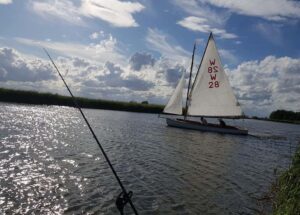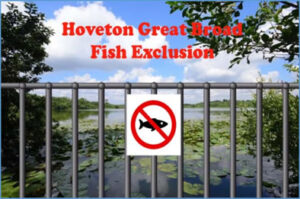Save our Fish Stocks – Petition launched to protect vital spawning grounds in the Norfolk Broads
 Angling, fishery and wildlife interests in the Norfolk Broads have come together to draw public attention to the extremely serious threat to fish stocks and the wildlife which depend upon them, as a result of the proposed fish barriers closing off Hoveton Great Broad (HGB) and Hudson’s Bay (HB) which are an integral part of the Northern Broads Catchment.
Angling, fishery and wildlife interests in the Norfolk Broads have come together to draw public attention to the extremely serious threat to fish stocks and the wildlife which depend upon them, as a result of the proposed fish barriers closing off Hoveton Great Broad (HGB) and Hudson’s Bay (HB) which are an integral part of the Northern Broads Catchment.
As part of the wider campaign the local Broads Angling Services Group (BASG), have today launched a petition calling for the Environment Agency decision to be reversed.
 The petition is now live on the Government website at – https://petition.parliament.uk/petitions/334111
The petition is now live on the Government website at – https://petition.parliament.uk/petitions/334111
Leading fisheries scientists and angling representatives have jointly condemned the decision by the Environment Agency (EA) in East Anglia to grant Natural England (NE) a permit to block off the major spawning site for fish at HGB/HB in the northern Norfolk Broads in order to combat turbidity and promote better weed growth. This is despite formal objections from the EA’s own fisheries staff backed up by seven years’ worth of fish surveys, studies and tagging costing more than £250,000 of rod licence and taxpayers’ money.
BASG has seen documents produced by the EA that clearly state the impact would be damaging, confirming the catchment-scale importance of HGB/HB for bream spawning and recruitment. This importance is demonstrated by the analysis of one tagged bream and it’s movements between Feb – May 2018, that show it moved some 183kms into and out of HGB several times until the right spawning conditions existed. This same fish exhibited these behaviours in all three years of monitoring.
If this damaging proposal is allowed, the knock-on impact over the protracted 10 years will have serious consequences to the social and economic value that anglers bring and enjoy across the Broads, affecting local businesses and jobs and potential drop in desired key wildlife species that people travel to see. Indeed, the annual fish recruitment provides much of the ecological food value for the wildlife that the Broads is so famous for. The EA granted a permit for the isolation of HGB to fish on the 27th July, after a public consultation and set against all the available evidence within its role as the competent body on such matters.
BASG has engaged and escalated this to the Angling Trust and Fish Legal to mount a national campaign to challenge this decision, in terms of its principles and legality. Our concerns are also shared by the Institute of Fisheries Management (IFM), the leading authority for fisheries in the UK.
The Angling Trust, as the National Governing Body for Angling, has written to Chairman of NE – the Applicant, EA – the Lead Authority and the Heritage Lottery Fund – the Funder, laying out the case to halt this perceptible mal-practice. Fish Legal will be looking at the legality of the whole process and mount a legal challenge if required
The BASG also sought to obtain, via an FOI request, the internal correspondence and objection that the competent body seemingly ignored when issuing the permit. Indeed, from the consultation public responses an over-whelming number were objecting to the scheme.
Nationally both the IFM and the Angling Trade Association are supporting the challenge.
Duncan Holmes Director BASG said
“The Common Bream is a key species in the success of the broads, they are fundamental in driving over £100m of angling tourism, and providing a vital food source for otters and bird life across the system. It astounds me how the UK’s largest conservation body is being allowed to use public money to block migration to the largest spawning area on the Broads, risking the survival of multiple species, while elsewhere in the country millions of pounds is spent removing spawning obstructions.”
Martin Salter, Head of Policy at the Angling Trust, added:
“The EA has a legal role as the competent body for protecting fish, through its permitting process, via the Water Framework Directive obligations and under the requirements to protect, enhance and improve freshwater fisheries, protect spawning fish and areas where fish spawn laid out in the Salmon and Freshwater Fisheries Act 1975. It really is quite extraordinary that they could even consider granting a permit for such a scheme that clearly drives a coach and horses through their duties as the nation’s leading environmental regulator”
Chris Turnbull Stalwart of Broads Angling said
The Broads Authority and English Nature have always had an awkward relationship with fish and angling and the Environment Agency have a duty to fisheries that they cannot brush aside. The value of the angling pound to the Norfolk Broads has always been overlooked and none of their bio-manipulation projects have ever been really successful, unless the water is separated from its wider catchment and turned into a showcase reserve. The idea that closing off huge areas of the broads, removing all the fish and bio-manipulating the water, so that one day they can all be reconnected and that will miraculously solve all the problems with water quality is laughable. Water quality issues on the broads is catchment wide, dealing with the symptoms by isolating individual broads rather than addressing the wider problems is folly, particularly when the upper-rivers that feed into the Broads are becoming choked with silt and contaminated by pesticides and nitrates sprayed onto the land.
Martyn Page Angling author, BASG director and founder of Angling Direct Plc said
I have fished on the Norfolk Broads for over 50 years. They form the largest and most well known freshwater fishery in the UK, frequented by thousands of anglers each and annually contributing over £100m to the Norfolk economy.
The Broads have been famous for their Bream since the 1800s but evidence shows that these are now threatened by the plans to close off their main spawning grounds on Hoveton Great Broad and as such potentially serious endanger not only the Northern Broads Bream stocks but also Pike (for which the Broads are also famous) as well as other fish eating birds and animals.
If access to spawning or breeding grounds we’re denied to Salmon, birds or other animals the project, which is totally unproven and questionable as far as success of it’s objectives are concerned, would not be allowed, Bream should be afforded similar protection and that project at least amended to ensure that Bream can continue to spawn successfully.
Phil Grey Angling Direct Wroxham said
“As Angling Direct Wroxham is in the heart of the Northern Broads system and very reliant on the superb fishing in the area, I am very concerned of the potential impact this project could have on the stocks of bream and pike, which the area is famous for and draws in anglers from all over the UK and beyond.
The evidence put forward by fishery experts indicated that this important spawning site should be left alone, if not the impact could damage the tourism trade in the area for maybe decades to come. This project could affect many other parts of this unique ecosystem let alone our trade, the hire boat trade and the holiday accommodation industry that is so dependent on the fishery as a whole.
I hope common sense prevails and Hoveton Great Broad can continue to be the ‘womb of the broads’ as I have heard it called and the decision to seal it off from the rest of the system is reconsidered and reversed. ”
Ruth Knight, Chair of Visit The Broads (the broads business representative body) said
“Angling plays a crucial role in the Broads’ visitor economy, from young families casting a line for the first time, to professional anglers returning year after year. The Broads attracts over 7 million visitors annually, supporting 7,000 local jobs and generating £600M for the local economy, with anglers making up almost 20% of the visitor numbers. They are particularly critical in the off-peak and shoulder months, and a significant fall in fish stocks would severely damage the reputation of one of Britain’s best known angling locations, taking millions of pounds out of the local visitor economy and placing hundreds of jobs at risk.”
ENDS
Notes:
Three ways to help.
* Sign the petition https://petition.parliament.uk/petitions/334111
* Write to your MP
* Subscribe to BASG and join the Angling Trust
BASG has continued with talks with Natural England and will become part of a project partnership team, working to ensure the latest permit conditions are fully met, in parallel with the continued objection and legal activity.
Watch bream underwater – this footage is a great example.
https://www.youtube.com/watch?v=Pa4WdaGKJQ4&feature=youtu.be&start=10&end=20
BASG has created a daily track for one Bream in the Northern Broads and shows how it swims 183kms in 88 days and uses Hoveton and Hudsons Bay as its annual spawning site.
https://basg.online/northern-broads-track-spring-2018/
The National Campaign from the Angling Trust is available below
The BASG campaigns page is available below
https://basg.online/campaigns/hoveton-gb/
Contact Information
Duncan Holmes 07879 691153 [email protected]
Kelvin Allen 07850 709769
Martin Salter




